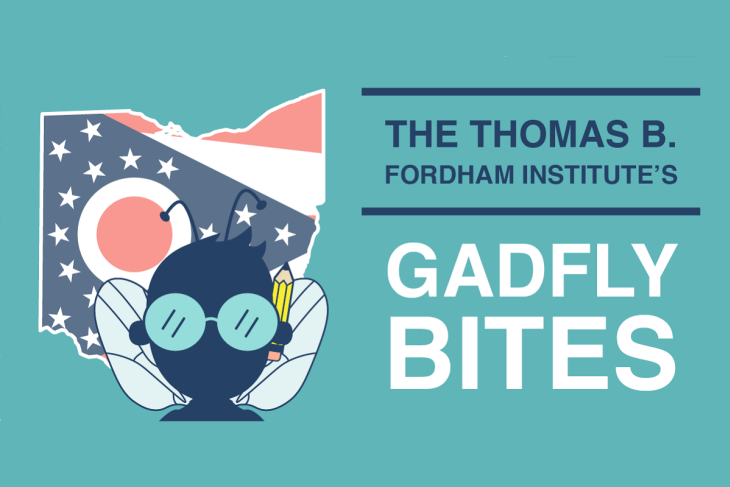- We’ll start at the top. In case you missed it, the Ohio House of Representatives passed HB 305 yesterday, which includes a revamp of the state’s school funding system. According to most news outlets, including the Dispatch clipped here for you, prospects for approval in the Senate dim right now. Sing it with me! Until then it is still just a bill… (Columbus Dispatch, 12/3/20)
- That picket line in Cleveland Heights-University Heights City Schools we talked about on Wednesday? It was gone less than 2 hours after it started and the rank and file have already overwhelmingly voted in favor of a new contract since that time. All that’s left is for the elected school board to approve it. (Cleveland.com, 12/4/20)
- Speaking of elected school board members, some of those who run Tipp City Exempted Village School District would like to be in charge of choosing members of the local public library’s board too. (No! Me neither.) I don’t know what all the district’s elected representatives are up to these days, but surely they’ve got plenty on their hands—what with one thing and another—that they don’t need to take on anything else right now. (Dayton Daily News, 12/3/20)
- So far during the pandemic, we have heard of exactly two Ohio school districts whose officials report kids doing as well or better under remote learning than they were under the old status quo. The first was bougie Bexley City Schools here in central Ohio, who actually gave us some numbers on that way back in October. It was also noted at that time the remote learning in Bexley was being provided not by local teachers but by “a third-party provider”. This week, we learn about another “third party” helping Bexley kids (and some Reynoldsburg and Groveport kids). They are college students at Capital University, working as virtual tutors for the school’s Reading Center initiative. Sounds awesome! How do kids find their way to these helpers? Entirely by “word of mouth,” says the center’s director. “Sometimes it’s a teacher who’s had a student in the program before, and sometimes it’s a parent who approaches us.” Hmmm… We also learn that “tutors prepare individualized lesson plans and support the material being covered” in their regular district classes (or the classes provided by third-party “vendors”). This is not a new initiative, but the center director adds: “In this day and age, when state testing is so important, parents have become really concerned about trying to help their child get back up if they’ve fallen a little behind or a lot behind.” (ThisWeek News, 12/3/20) So the other district, far on the other end of the bouge-scale (ask anyone!), seeing positives for students in remote learning is Youngstown City Schools. Several weeks ago, district CEO Justin Jennings told the Ohio PTA organization that remote learning had “helped a lot of students, especially because they can work at their own pace.” He also said that he believes student data is “important overall”, especially if students and parents “know what the data means” when it comes to their own scores. Keep all that in mind when you look at a piece from this week which, ostensibly, discusses the difficulties of administering state tests—currently required by law to happen—during a pandemic. It is, as I’m sure you can probably tell just from my description, part of the effort to get spring testing cancelled ASAP…by those who want such a thing to occur. We are told that Columbus City Schools, which has remained in fully-remote learning mode since March, only managed to test 36 percent of its third graders this spring. Columbus superintendent Talisa Dixon told the Dispatch, “Was it a priority for us to have students take the test, or was it a priority for us to make sure students and families were safe?” Luckily there is a workaround for third grade testing because Columbus decided on its own to deem this test “optional” and only students whose families affirmatively stated they wanted their youngsters tested were ultimately tested. (I can’t wait to see who those families can you?!) By comparison, Youngstown City Schools, also fully-remote since March, managed to test 95 percent of its third graders in the same timeframe. While CEO Justin Jennings said would have been his preference not to have in-person testing for the same concerns over safety, he told the Dispatch, “As long as those requirements are in place…we will continue to do whatever we need to do to be in compliance.” (Columbus Dispatch, 12/2/20) On top of all of that, CEO Jennings addressed the Youngstown Rotary Club this week and told the virtual assembly that his goal as the head of the academically-distress district was to “put [him]self out of a job,” a line which I’m sure earned him a tinny whiff of electronic mirth and a couple of those Zoom-y hand clap emojis…for various reasons. But Jennings himself went on to explain why this was his aim: Because if the Youngstown City School district improves so much that the state releases it from a declaration of academic distress (and all that STILL comes with it despite years of organized pushback, hah!), that would mean that the district’s students “are getting what they need to get in our test scores, in our graduation rate, and all those different things are getting raised.” Well said, sir. (Youngstown Business Journal, 12/3/20)
- Throughout the saga of Academic Distress Commissions (more than five years now, my dedicated subscribers, can you believe it?), we have noted the similarities between current state academic intervention methods and long-standing state fiscal intervention methods. And here we are again. Springfield Local Schools in northeast Ohio is in fiscal caution status due to a five-year budget projection in the red. While the state has recommended cuts to balance the books, as they usually do, the district instead pinned its hopes on a levy. Their prerogative, of course, but when that roll of the dice came up craps last month, they were right back at square one. (Or maybe even worse with, you know, the rona.) And so a plan of “devastating” cuts has been introduced by the elected school board, including closing one elementary school, eliminating some sports, and paring busing back to bare minimum. The rhetoric in this piece hews uncomfortably close to the line of saying the state is forcing the district to make those specific and unpopular cuts and that state officials were “compelling” these actions, but I suppose when the only thing you really want is for your voters to pony up without question, such a tack would probably make sense. And, yes, there will be another levy ask ASAP. (Akron Beacon Journal, 12/2/20)
- Finally this week, back in the real world (trust me on this), who’s ready to Rrrrrrrrrrrrrrrumble?! Esports in Ohio have not lost a quantum of momentum this year, as you might imagine and its already time for the Varsity Fortnite Fiiiiiiiiiiinaaaaaaaaaaaals!
Nerdsteams from Ashland and Barberton high schools will go byte-to-byte this Monday evening, the fifth and sixth tournament seeds defying expectations to reach the finals. Best of all, literally anyone in the whole world can watch. Full send, baaaaybeeeeeeee!!!!! (Ashland Source, 12/4/20)
Did you know you can have every edition of Gadfly Bites sent directly to your Inbox? Subscribe by clicking here.
Policy Priority:
Topics:




